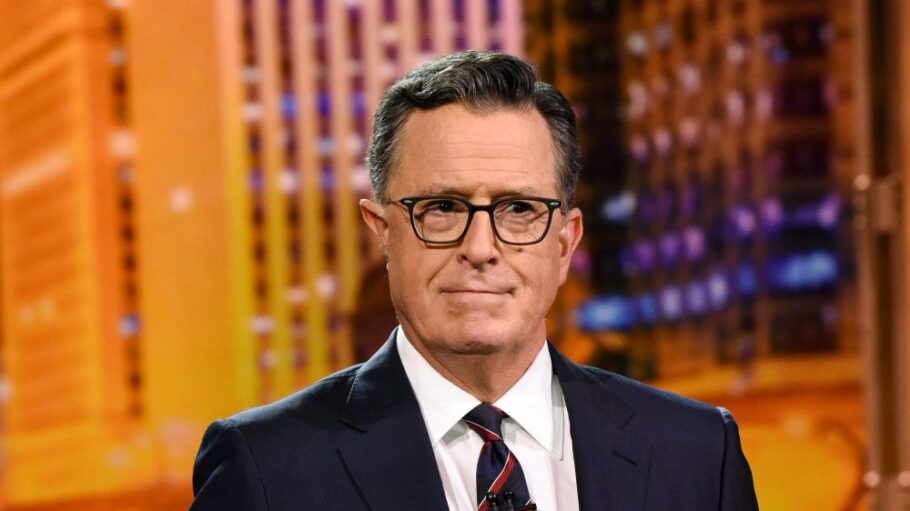The news of “The Late Show’s” cancellation by CBS doesn’t just end a franchise that had, to this point, lasted more than 30 years. It looks like the beginning of the end of an entire category of television. With one network now opting out of late-night talk entirely, how long will it be before the genre just goes away?
CBS announced the cancellation nearly a full year before it is to take effect, making current host Stephen Colbert a lame duck of sorts; he will continue hosting the show through May 2026, at which point it will simply disappear. Observers have noted with interest that Colbert has, lately, been especially critical of CBS’s parent company, Paramount; while this may have made him less beloved internally, the trendlines on late night have been moving in the wrong direction for some time.
Taylor Tomlinson, whose “After Midnight,” also on CBS, was designed as a less cost-intensive alternative once James Corden left the network, decided to return to stand-up comedy full-time; rather than finding a new host, CBS simply axed the show. Seth Meyers, on NBC, has been asked to cut back on expenses, including, last year, firing the band who had provided his show structure and groove. And thrumming under celebratory coverage of Lorne Michaels, as his creation “Saturday Night Live” marked its 50th anniversary, has been the sense that whomever is his successor will not have the leverage at NBC to continue to put on quite so lavish a show. (That’s to say nothing of the fate of “The Tonight Show” and “Late Night,” which Michaels also produces.)
Could “SNL,” which so defines the national cultural agenda, just… go away? A day ago, I wouldn’t have thought “The Late Show” would. The show’s high-toned attempt to be a sort of comedy/public-affairs hybrid did not land for this viewer, but no matter: After initial struggles to break through, Colbert’s liberal, newsy sensibility connected with viewers in the first Donald Trump administration, and vaulted him ahead of NBC’s Jimmy Fallon and ABC’s Jimmy Kimmel in his timeslot. His perspective was important enough to the network that they’d put him on live after major news, like last year’s debate between Trump and Kamala Harris, so that he could respond in real time.
The fact is, though, that the coin of the realm in late-night is not whoever still has their television set turned on in the wee hours; hosts must generate moments that, the next morning, go viral. (Inasmuch as late night has a future, then, it looks more like Fallon, whose inane “Jorts Summer” video with Nick Jonas and Will Ferrell traveled all over my social feeds the day Colbert’s news broke. Everyone I saw sharing the video was mocking it — but they were sharing it.) What Colbert was trying to do — convene discussions that had a tie back to current events — doesn’t have much of a place in culture nowadays.
The question is, though: What does? Late night can be silly, or inane, or (in Colbert’s case, at times) a bit grandiose, but it’s also a format rooted in the earliest days of television. The fact of late night’s longevity to this point isn’t, alone, a reason to mourn it, but the ambition of those early days might be: In history, television was a uniting force, a sort of national gathering-place. And late night had a certain cathartic effect, summing up the day that was. I’m old enough to remember the intense yearning for Colbert’s predecessor at CBS, David Letterman, to speak to the national mood in the days after Sept. 11, 2001; that he did so with grace and aplomb came as no surprise.
Late night going away piece-by-piece is, in some ways, a business responding to the marketplace; no one expects Colbert, Kimmel or Fallon to heal the wounds of the nation, and far fewer people watch any of them than watched Letterman or Jay Leno at the turn of the century. But, as with so much lately, from the massive (the dismantling of the federal government) to the relatively small-bore (the New York Times tearing up its criticism desk seemingly without a forward-looking plan), the problem isn’t necessarily that something is going away. It’s that nothing is coming to replace it. From the jobs of the many craftspeople it takes, in collaboration, to make a “Late Show”-style enterprise go to the place it occupied in our culture as a lighthearted staging-ground for talk between two people at a time — no new thing will be that.
Love Film & TV?
Get your daily dose of everything happening in music, film and TV in Australia and abroad.
If there’s one defining flaw of the social-media apps that have replaced television as the primary conduit for information and entertainment, it’s their siloing effect — everyone getting entertainment custom-tailored for them sounds like a dream until one realizes that no one is in conversation with anyone else. We’re all just talking to ourselves. “The Late Show” and its competitors are not a public good, and CBS isn’t required to subsidize something that isn’t serving their interests. But even still, it’s worth mourning a type of show premised on the idea that we all lived in a shared reality, one that a gifted bridger of increasingly broad gaps between us might make coherent and make funny. “The Late Show” wasn’t built for these times; one dreads imagining the type of show that would be.
From Variety US































